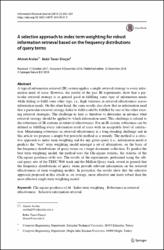A selective approach to index term weighting for robust information retrieval based on the frequency distributions of query terms
Abstract
A typical information retrieval (IR) system applies a single retrieval strategy to every information need of users. However, the results of the past IR experiments show that a particular retrieval strategy is in general good at fulfilling some type of information needs while failing to fulfil some other type, i.e., high variation in retrieval effectiveness across information needs. On the other hand, the same results also show that an information need that a particular retrieval strategy failed to fulfil could be fulfilled by one of the other existing retrieval strategies. The challenge in here is therefore to determine in advance what retrieval strategy should be applied to which information need. This challenge is related to the robustness of IR systems in retrieval effectiveness. For an IR system, robustness can be defined as fulfilling every information need of users with an acceptable level of satisfaction. Maintaining robustness in retrieval effectiveness is a long-standing challenge and in this article we propose a simple but powerful method as a remedy. The method is a selective approach to index term weighting and for any given query (i.e., information need) it predicts the "best" term weighting model amongst a set of alternatives, on the basis of the frequency distributions of query terms on a target document collection. To predict the best term weighting model, the method uses the Chi-square statistic, the statistic of the Chi-square goodness-of-fit test. The results of the experiments, performed using the official query sets of the TREC Web track and the Million Query track, reveal in general that the frequency distributions of query terms provide relevant information on the retrieval effectiveness of term weighting models. In particular, the results show that the selective approach proposed in this article is, on average, more effective and more robust than the most effective single term weighting model.


















